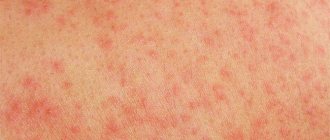Home>Articles>Allergy to alcohol
quick menu (hide)
- Manifestation of allergies
- What to do if you have an allergy
- Treatment of the disease
- Traditional treatment
- Symptoms
- Choking after drinking alcohol
- Compatibility of alcohol with antiallergic drugs
- Medicines that cause alcohol allergies
As you know, many alcoholic drinks contain various additives that can cause an allergy to alcohol. It consists in increasing the volume of toxic components entering the blood system from the intestines. Let's talk about this in more detail later.
Allergy to alcohol
The body can react very powerfully to alcohol additives. The raw materials used to make alcohol can also cause a reaction. Alcohol in its pure form does not have the properties of an allergen, but it increases the likelihood that certain allergens from the intestines will enter the bloodstream.
The manifestations will be of the most typical nature:
- Alcohol allergies are accompanied by red spots on various parts of the body;
- Alcohol allergies are accompanied by spots and blisters on the skin ;
- The appearance of swelling on the face or other organs;
- Limited increase in body temperature ;
- Itching in the skin.
These symptoms may mean you need to take an antihistamine or prednisolone.
In the most severe cases, we can talk about the development of general symptoms, in which:
- breathing becomes difficult;
- weakness appears, severe pain in the thoracic region, back, pressure drops;
- a person faints and has convulsions.
To determine the exact cause of these symptoms, you should consult a medical specialist for advice.
Alcohol intolerance - symptoms
Alcohol intolerance occurs:
- blush on the face, redness of the skin;
- hives;
- increased body temperature;
- headache;
- heartburn and abdominal pain accompanied by nausea or vomiting;
- diarrhea;
- nasal congestion;
- labored breathing;
- a sharp decrease in blood pressure;
- arrhythmia - irregular heartbeat in the form of missed or extra beats. Associated symptoms include chest pain or pressure, shortness of breath and fainting;
- in patients with an asthmatic component, the above symptoms are aggravated.
What actions should you take if you are allergic to alcohol?
If a reaction occurs, it is necessary to check whether the person is conscious and whether he has problems with the respiratory system. The occurrence of complications requires the use of any anti-asthma inhaler.
If everything is fine with the breathing of a person having an allergic reaction, then you should rinse the empty stomach with water, give him acrivastine or another antihistamine, and after 10 minutes give prednisolone in a certain dose. If there are no positive results, you should immediately call an ambulance.
Alcohol-related allergens
If during a fun celebration a person suddenly develops an allergic reaction, then the following were quite capable of causing it:
- dessert, which includes cognac, liqueur or other aromatic or strong alcohol,
- barbecue meat that has been marinated in wine,
- wine sauces,
- any other dishes that were prepared using alcohol.
Medicines containing ethyl alcohol can cause a strong reaction Cosmetics that contain alcohol can also cause a reaction.
If a person has a genetically determined alcohol intolerance that causes a severe reaction, they should try to avoid ethanol in any form. It is necessary to take care of strong antihistamines, which you will always have to carry with you. When choosing cosmetics or hair dye, you must do an allergy test. This will avoid hospitalization and placement in the intensive care unit.
How to treat an allergy to alcohol?
After this, you need to be examined by your family doctor.
If such a problem recurs, you should determine the cause of its occurrence: the type of drink, the amount of alcohol consumed, or the very fact of drinking it.
If symptoms recur on a regular basis, you should pay attention to the following recommendations:
- If you are allergic to the same drink, you must stop drinking it;
- If allergies occur, do not drink alcohol with a complex composition containing a large number of additives that cause allergies.
- If you are allergic to vodka, avoid pure alcohol.
If allergies occur irregularly after drinking, in subsequent times it is necessary to focus on supporting the digestive system:
- preventive use of enzymes that improve the digestion process (mezim, creon);
- timely adoption of sorbents , etc.
Causes of allergies
Most cases of the body's reaction to alcoholic beverages are cases of pseudo-allergy. True allergies are a rare phenomenon. The immune system reacts to chemical additives and substances in the alcohol product rather than to ethanol itself. So a true allergen can cause a pseudo-allergy to alcohol. There are also histamine-releasing products that provoke or enhance the release of histamine.
With this combination, a vivid picture of an allergic reaction is obtained, although it is by no means provoked by ethyl alcohol. The main causes of alcohol allergy symptoms include:
- The presence of components that trigger the body’s immune response: herbal ingredients, flavors, preservatives, etc.
- Low quality of alcohol-containing products
- Lack of proper level of drink purification
- Drinking large amounts of alcohol at one time
In addition, a false allergy can develop in people who have been abusing alcohol for a long time. This happens due to the fact that the mucous membrane of the digestive tract is damaged, so allergens easily enter the bloodstream.
Symptoms of an allergy to alcohol
Alcohol without impurities is not characterized by allergen properties. This is due to two reasons: the inability of it to form an antigenic determinant due to the size and structure of alcohol molecules, and also the fact that alcohol does not have the properties of a natural metabolite.
Many people believe that their body reacts to glucose or ascorbine.
When allergies develop, we can talk about the following possible reasons:
- The role of an allergen is played by a certain substance - an impurity present in a strong drink;
- Alcohol negatively affects the body, therefore, in the body of a person who drinks alcohol, the formation or entry into the blood of other allergens begins to occur.
Consequences of drinking alcoholic beverages
In case of progression of contact, atopic, seborrheic and, of course, allergic dermatitis, there is a possibility of a deterioration in overall health. This condition can manifest itself in different ways. The measures taken in these cases depend on the specific circumstances.
- If you have an initial reaction to a new alcoholic drink, you should avoid it.
- If previously it was absent, and then began to appear in almost any type of similar products, you should consult a doctor and take a test for allergens.
- If there were symptoms, but new signs were added to them, it will probably be necessary to repeat the test and relevant tests in order to clarify the diagnosis.
By consuming alcohol, a person also runs the risk of increasing the basic manifestations of the symptomatic picture. For example, there is likely a change in blood pressure (in the clinical picture of the disease this occurs in a lower direction), fever and chills, pain in the throat, and the appearance of wheezing.
Possible attacks of suffocation and a feeling of lack of air, the appearance of pallor in the skin area, which spreads throughout the body. The patient is plagued by nocturnal cough syndrome, a complex of symptoms affecting the functioning of the gastrointestinal tract (gag reflex, nausea, pain in the stomach and intestines, increased foaming, diarrhea).
Alcohol consumption by an allergic person can lead to a set of additional symptoms:
- hyperemia on the skin of the arms, torso, neck, face in children and adults;
- a rush of blood to the head area, which causes pain and dizziness;
- changes in the condition of the skin (formation of dryness, peeling, red spots);
- instant intoxication, and to achieve this state a significantly smaller volume of drink is required than before;
- problems with the functioning of the heart muscle;
- swelling on the face;
- the appearance of extraneous rashes;
- tearfulness.
If any of these signs occur, it is necessary to stop drinking alcohol and lead a healthy lifestyle. You should contact your doctor and tell him about the problem with a detailed description. Only this approach will prevent complications and feel better.
Choking after drinking
A sign of a deadly allergic reaction to alcohol, such as anaphylactic shock, is choking associated with severe swelling of the larynx. Fortunately, such allergies occur in practice in extremely rare cases.
Acetic acid can cause anaphylactic shock. Cases of patients with an allergy to white wine, manifested in problems with the respiratory tract, have been described in detail by medical specialists from Australia. Allergies in their patients were expressed not only by swelling of the face and larynx, but also by the appearance of red spots on the skin. Patients were treated by taking antihistamines. After 100% abstinence from alcohol, they no longer had allergies.
In addition, the cause of anaphylactic shock can be components contained in alcohol: metabisulfites, wasp venom, etc. - in wine; metabisulfites, hops, etc. - in beer.
What alcohol is dangerous for allergy sufferers?
The likelihood of developing an allergy increases rapidly when drinking alcohol with a large number of ingredients. And, on the contrary, one- or two-component drinks rarely provoke the appearance of spots on the skin, shortness of breath, or nausea. The least allergenic alcohol is made from grain crops - barley, rye, corn, rice. This is beer, ale, whiskey, sake without the addition of flavors and dyes. The only exception is wheat, used in the production of vodka and some whiskeys. It contains proteins that are the strongest allergens. The most common types of alcohol that :
- dry and fortified wines, brandy and cognac . Their production uses grapes saturated with polysaccharides, organic acids and other bioactive substances. Raw materials for cognac and brandy undergo multi-stage purification, so potential allergens are removed at each technological stage. Wine is produced by natural fermentation of grape juice, so that almost all allergens are preserved in it;
- tinctures with rowan, viburnum, black currant . Allergy symptoms after taking a portion of intoxicating drink are caused by one of the ingredients from the chemical composition of the berries. For example, if you are intolerant to rowan, there is a 100% chance that using a tincture from it will lead to urticaria or Quincke's edema;
- rum, tequila . To prepare these types of alcohol, exotic raw materials are used - sugar cane, condensed agave juice. A person who tries them for the first time can feel all the signs of an allergy, without even knowing about his intolerance.
But the honorable first place is occupied by alcoholic drinks with phytoextracts - concentrated extracts from plants. They are part of famous and popular liqueurs: Becherevka, Galliano, Sambuca, Absinthe. Amaretto contains almonds, Limoncello contains lemon, Baileys contains cream and chocolate. So allergy sufferers should carefully study the composition of the drink so as not to seek medical help after the first glass.
Increased risk of allergic reactions
Most often, allergies occur to wine, as well as to beer as a highly allergenic drink. But in practice, it is extremely rare to observe an allergy to beer.
Allergies are mainly caused by salicylates (grape substances) found in wine. Therefore, people who are highly sensitive to aspirin are advised to completely forget about drinking wine.
Naturally, asthmatics have a high sensitivity to allergens, but not only allergy sufferers can suffer from such reactions to alcohol. A drinker may have an attack, even if he has never suffered from anything like this before.
How do allergens get into alcohol?
Photo: rawpixel.com / freepik.com
So where do those allergenic components come from in alcoholic drinks? It is not at all necessary that it be just a dye in the composition of cheap wine. Although in most cases they, along with stabilizers and flavorings, are the main culprits. There are enough microimpurities that are not written about on the bottle. For example, many sparkling and other wines sometimes “give” their admirers sulfur dioxide, which is used to water the vineyards. Of course, not every drinker will develop an allergy, but the “lucky” ones will quickly have no time for romance.
Medicines for alcohol addicts that cause allergies
Often, relatives of alcoholics who do not want to change anything in their lives look for a way out of this situation by looking for medications such as disulfiram, which cause an unpleasant reaction to alcohol. They explain this by saying that if a drunkard feels bad after drinking, he will lose the desire to drink alcohol. However, here you need to understand that these drugs do not cause allergies, but simply fight the action of enzymes that help the body digest the dose of alcohol introduced into the body. As a result, the duration of poisoning of the body increases, which only greatly worsens the person’s well-being.
Therefore, this method cannot be considered as an option for getting rid of alcohol addiction, because it can even lead to a fatal result.
First aid
If a person has a strong and pronounced reaction that threatens the life and health of a person, then it is necessary to know what measures to take to save the person’s life (every fifth case of anaphylactic shock ends in death).
It is urgent to call an ambulance and clearly explain what happened. It is necessary that doctors understand that this is a case of anaphylactic shock and arrive immediately, and do not redirect the call to the emergency service, from which you can wait quite a long time for a doctor.
As first aid, a person must be given absorbents that will help eliminate ethanol breakdown products from the body, which can also cause allergies. If there are breathing difficulties, it is necessary to give the person bronchodilators, give him a massage and arrange to wait for the doctor in a comfortable semi-sitting position.
Alcohol allergy: causes of occurrence
An allergy to alcohol is always a protective reaction of the body, but the mechanisms of its occurrence vary.
Is there an allergy to alcohol, that is, to alcohol specifically? No. Ethyl alcohol does not have a protein structure, and its molecules cannot become an allergen. That is, the reaction does not manifest itself specifically to alcohol, but to additives present in drinks.
A general rule can be identified for all drinks: the more additives in alcohol, even natural ones like herbs, the higher the likelihood that an allergy will appear if there is a tendency to it.
Grain alcohol and allergies
Grains are the basis for the production of beer, ale, Scotch whiskey and exotic spirits such as tongba. Cereals themselves rarely cause allergies, except for wheat, which is used in the production of vodka, vodka and wheat whiskey. Wheat is one of the most common food allergens.
In the case of drinks made from grain crops, the reaction manifests itself in yeast.
Note! The “safest” grain drinks are sake, bourbon, and millet craft beer, since they are prepared on the basis of rice, corn and millet, grains that are least likely to cause allergies.
Allergy to drinks made from berries, fruits, herbs
The most common berry drink is wine. It is also the most allergenic of the berries, since grapes are the worst processed during the manufacturing process when comparing wine with other drinks, for example, brandy or rakia. In the last two, the grapes also undergo heat treatment, which reduces the overall allergenicity of the drink.
That is, if you are allergic to wine, you will not necessarily have a reaction to brandy. However, it’s not worth the risk: the information is provided to explain why the body reacts differently to grape drinks.
Note! Despite the fact that berries and fruits are poorly processed in homemade tinctures, such drinks are less allergenic because they do not contain dyes or preservatives.
The most dangerous are herbal drinks. The most powerful allergen is wormwood, from which absinthe is made. Also in this kind of drinks allergens can be:
- Mint, cinnamon, nutmeg, fennel and other spices and herbs - vermouth, absinthe.
- Almonds, chocolate, anise, coffee - liqueurs, including Amaretto, Baileys.
- Anise - sambuca.
It is important! If you are prone to allergies, then avoid the supposedly natural Jägermeister and Becherovka. Despite the fact that they are infused with herbs, they contain preservatives and dyes (the composition of Jägermeister is generally kept secret), which together can cause a strong allergic reaction. The safest of the herbal drinks is tequila. It is prepared from agave juice, an allergy to which is extremely rare.








